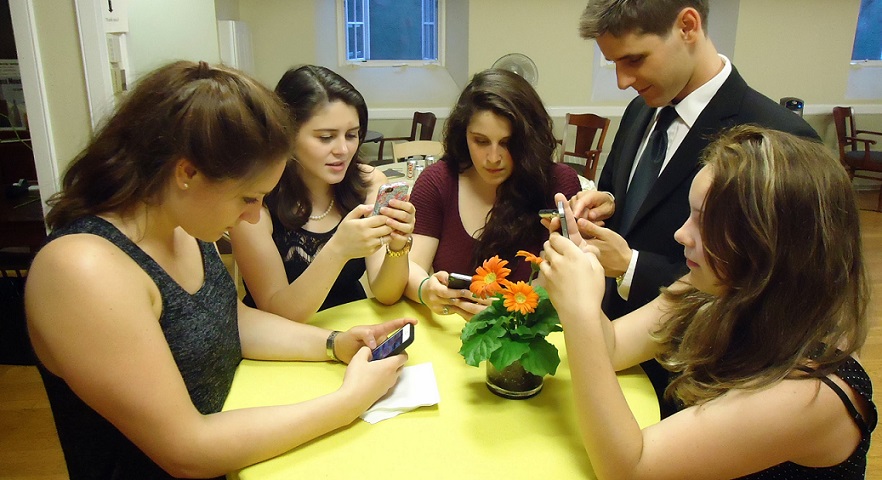.
The Phones
with apologies to Edgar Allan Poe
Phones, phones, phones,
See the people with their phones,
Silver, pink and paisley phones,
On the subways and the buses and the sidewalks, all alone,
Lost in intimate exchanges with their phones, phones, phones.
Hear the murmuring of phones,
In their muffled monotones,
Feel the muted tremulations, like the buzzing of the drones,
Hear the pinging and the dinging of the phones..
Passing time, time, time,
In a strange robotic rhyme,
With the tintinnabulation of the tones, tones, tones,
All the people look the same to me, like clones, clones, clones.
See the driver with the phone,
How it chills you to the bone,
See a world of seven billion navigating all alone,
Through the secret sibilations of the phone, phone, phone, phone, phone, phone, phone.
.
.
Desire
Emerging from the dawn’s ambrosial mist
in starry veils from milky galaxies;
seductive as the Satyr in a tryst
with waves voluptuous on surging seas;
her smile induces songbirds to rejoice,
her skin is silken, like a cherub’s wings,
her lips are passion’s reddest fruit, her voice
caressing, comforting, in whisperings
of breezes barely stirring; in her eyes
there burns a black quiescence that defies
surrounding gales, and in her soul the prize
of fire Promethean to tantalize
the troubadours who lust for dawn’s reprise
while fevered loins and lyrics agonize.
.
.
Paul, a lifelong Chicagoan and retired college teacher, is an author of books, poems, progressive essays, and scientific journal articles. He recently completed his first historical novel, 1871: Rivers on Fire. His most recent non-fiction book was Disposable Americans, published in 2017 by Routledge.















Paul, I smiled all the way through “Phones” — and started laughing out loud when I got to “clones, clones, clones”! I think this is a very clever echo of “Bells”, with wonderful phrases like “muted tremulations” and “robotic rhyme”; and with the last verse — with its distracted driver — subtly suggesting the funeral bells at the end of Poe’s poem. Beautifully done!
Thank you, Cynthia!
Paul, loved both poems. Being big Poe fan, Phones really rang true:-)
Thank you, Tonia!
I’m unqualified to speak to the quality of your poems, but I will say that I was prompted to read the weensy, but not insignificant bio at the bottom of the page. I was hoping you had written other things I might read, and, indeed, you have. I might see you around in cyberspace, sir.
Thanks, Gail
Mr. Buchheit, I think they’re both terrific. Poe is one of my long-time favorites. I’m impressed that you found an analogy between his “bells” and the omnipresent ring tones of cells. I love the Romantic style of “Desire” also. Keep up the great work!
Thanks so much, Cheryl.
Hi, Paul – great name, by the way.
‘The Phones’ really resonated. I recall a student coming to me to beg me not to report him for cheating. In mid-beg his phone rang, so he shut me down with a ‘halt’ gesture while I was explaining how socially unacceptable cheating was, answered his phone, and…was reported for cheating.
Thanks for the reads. To my shame, I’m off to read ‘The Bells’ for the first time – I thought it was written by Quasimodo. I have read ‘The Raven’, by Poe, however, you’ll be glad to know.
(Just read ‘The Bells’ – wow! Your satirical take is spot on.)
Mr. Freeman,
In case you’re interested, Rachmanninov’s Op. 35 is a setting of a free translation of “The Bells.”
I appreciate that, Paul!
Two fine poems, Mr. Buchheit, impressive in quite different ways.
Thanks, Julian.
Splendid imitation of “The Bells,” with perfect rhythm. Interesting take on the troubadours to personify Desire. Don’t know that they would have escaped for long, though; your sonnet is one of the fastest moving I’ve seen, especially when you get to the sestet with a single rhyme sound. But that may have taken you a while in careful crafting!
Margaret, thank you so much!
Paul, I love the lexical dexterity and wicked wit of ‘The Phones’. I am sure if Poe were here, he would smile at this accomplished nod to ‘The Bells’. Although the poem employs a delightful dose of humor, it makes a very important statement about the sad state of being enslaved to our phones at the expense of partaking in real life today.
‘Desire’ is a seductive, delicious, delightful sonnet. I especially like the closing couplet. Thank you for these!
Thanks very much, Susan!